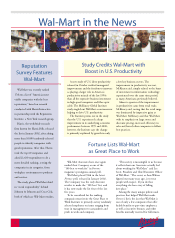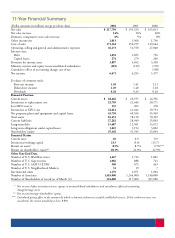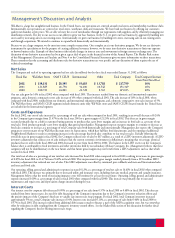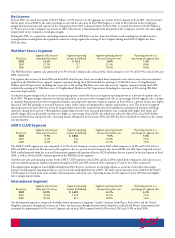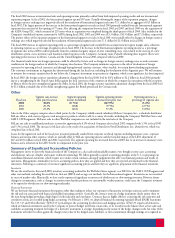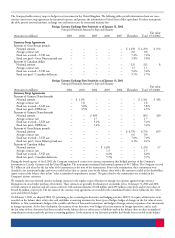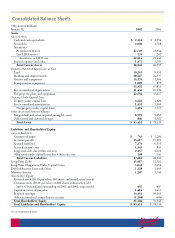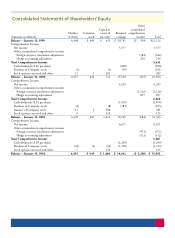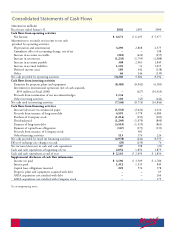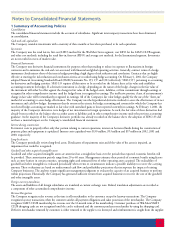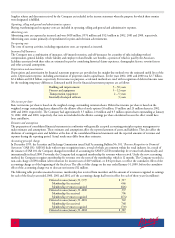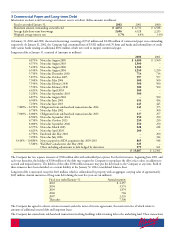Walmart 2002 Annual Report Download - page 25
Download and view the complete annual report
Please find page 25 of the 2002 Walmart annual report below. You can navigate through the pages in the report by either clicking on the pages listed below, or by using the keyword search tool below to find specific information within the annual report.
23
sheet, adoption of SFAS 133 did not materially impact our Consolidated Financial Statements taken as a whole. However, certain swap cash flows
amounting to $86 million in fiscal 2002, which would have been recorded in the income statement under the previous accounting guidance, were
recorded on the balance sheet in other accumulated comprehensive income. In fiscal 2001, prior to the adoption of SFAS 133, the Company recorded
$112 million of earnings benefit in the income statement from the receipt of similar cash flows. Under Statement 133, cash flows from fixed to variable
interest rate swaps continue to be recorded in the interest expense line of the income statement. For fiscal 2002, the effects of fixed to variable interest
rate swaps reduced interest expense by $62 million. Management is uncertain of the future impacts of the Company’s fixed to variable interest rate
swaps on interest expense.
With the adoption of SFAS 133 and the termination of a significant portion of Company’s net investment hedges, the Company is currently
reevaluating its hedging strategy regarding its net investment in overseas operations.
New Accounting Pronouncements
In June 2001, the Financial Accounting Standards Board issued Statements of Financial Accounting Standards No. 141, Business Combinations, and
No. 142, Goodwill and Other Intangible Assets, effective for fiscal years beginning after December 15, 2001. Under the new rules, goodwill and
intangible assets deemed to have indefinite lives will no longer be amortized but will be subject to annual impairment tests in accordance with those
Statements. Other intangible assets will continue to be amortized over their useful lives.
We will apply the new rules on accounting for goodwill and other intangible assets beginning in the first quarter of fiscal 2003. Application of the
nonamortization provisions of the Statement is expected to result in an increase in net income of approximately $250 million for fiscal 2002. Prior to
the completion of the second quarter of fiscal 2003, we will complete a transitional impairment review for goodwill and indefinite lived intangible assets
as of the date of adoption. Subsequently, we will perform similar impairment reviews on an annual basis. Management does not believe that the
adoption of the impairment review provisions of the statement will have a material effect on the earnings and financial position of the Company.
In August 2001, the Financial Accounting Standards Board issued Statement of Financial Accounting Standards No. 144, Accounting for the
Impairment or Disposal of Long-Lived Assets (SFAS 144), which addresses financial accounting and reporting for the impairment or disposal of long-
lived assets and supersedes SFAS No. 121, Accounting for the Impairment of Long-Lived Assets and for Long-Lived Assets to be Disposed Of, and the
accounting and reporting provisions of APB Opinion No. 30, Reporting the Results of Operations for a Disposal of a Segment of a Business. SFAS 144
is effective for fiscal years beginning after December 15, 2001, with earlier application encouraged. We will adopt SFAS 144 as of February 1, 2002 and
do not believe that the adoption of SFAS 144 will have a material impact on our financial position or results of operations.
In May 2000, the Emerging Issues Task Force (EITF) reached a consensus on Issue 00-14, Accounting for Certain Sales Incentives. This issue involves
the accounting and income statement classification for sales subject to rebates and revenue sharing arrangements as well as coupons and discounts. The
EITF concluded that sales incentives offered to customers to buy a product should be classified as a reduction of sales. This issue is effective for fiscal
quarters beginning after December 15, 2001. We anticipate implementing this issue in the first quarter of fiscal 2003; however, we do not expect any
reclassification because of our Every Day Low Price Strategy and because rebates and coupons accepted by the Company’s stores are offered by the
product supplier and not by the Company. As a result, the adoption of this guidance is not expected to have a significant impact on the Company’s
financial position or results of operations.
Forward-Looking Statements
The Private Securities Litigation Reform Act of 1995 provides a safe harbor for forward-looking statements made by or on behalf of the Company.
Certain statements contained in this Management’s Discussion and Analysis, in other parts of this report and in our other filings are forward-looking
statements. These statements discuss, among other things, expected growth, future revenues, future cash flows and future performance, the anticipation
and expectations of the Company and its management for future occurrences. The forward-looking statements are subject to risks, uncertainties and
other factors, including: the cost of goods, competitive pressures, inflation, consumer debt levels, currency exchange fluctuations, trade restrictions,
changes in tariff and freight rates, interest rate fluctuations and other capital market conditions, and other risks that the Company discusses more fully
in its filings with the SEC, including the Company’s Annual Report on Form 10-K. We filed our Annual Report on Form 10-K for our fiscal year 2002
with the SEC on or about April 15, 2002. Actual results may materially differ from anticipated results described in these statements as a result of
changes in facts, assumptions not being realized or other circumstances.


